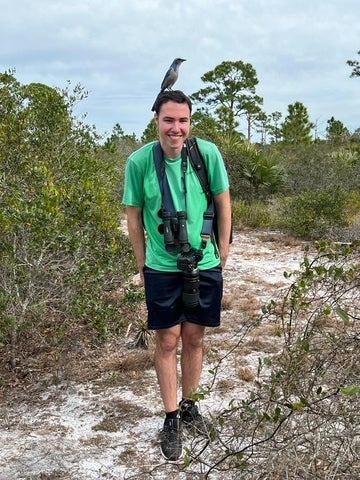Why did you choose Waterloo?
I grew up in Miami, Florida, and did my undergraduate degree in mathematics at Rice University in Texas. I realized in my later undergraduate years that I wanted to pursue graduate-level discrete mathematics, particularly graph theory, and the Combinatorics and Optimization department at Waterloo is among the best in the world for that. I also liked the college town, intellectual feel of Waterloo.
What does a typical day look like for you?
On a typical day, I commute in the morning to my office on campus either by bike or bus. I spend my morning catching up with research in my office, reading arXiv, sending emails, or working on a manuscript. I usually take a break to have lunch with my friends in the graduate lounge. Then I go back to doing some TA work in my office – I grade and hold office hours every week or so – and I work on my research. Some of this research is solo, some of it takes place on a whiteboard with collaborators, and sometimes it’s with my supervisor, Dr. Penny Haxell.
I finish my work day by engaging in some form of exercise that varies by the day: walking, running, cycling, rock climbing, or the gym. Then I go home for dinner and relax either with a book or some videos.

What do you do for fun?
I do a lot of birding and wildlife photography. I spend a lot of my free time looking for and taking photographs of birds and other wildlife, and it is especially fun to find migratory birds in April, May, September, and October. I Like to visit parks throughout the Waterloo region, especially ones with large wetlands: Columbia Lake, Laurel Creek, Lakeside Park, Huron Natural Area, and Grand River Trail.
I have a project to find as many bird species in Ontario (and other places) as I can, and to take a decent photograph of a lot of them. There are almost 500 species to be found in Ontario, and almost 300 species that breed in the province. I am currently at around 200 species.
Do you have any advice for incoming graduate students?
My advice for incoming grad students would be to take your working life seriously, but not too seriously. You will often desire to be great at multiple things all at the same time: your courses, research, health, hobbies, social life, sleep, whatever you prioritize. But it is hard to balance all those things without settling for mediocrity or burn out. Instead, I would advise you to be serious about only a few of your ambitions for an appropriate period of time, and to be just serious enough about your other ambitions at this time so they do not overly deteriorate. Then you will not feel as bad when your commitments inevitably have to change.